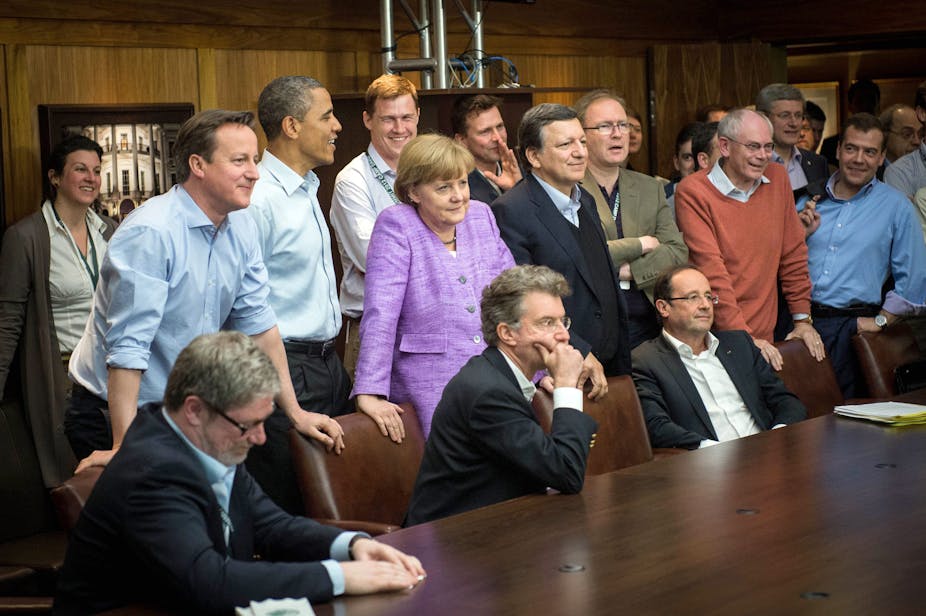The G8 leaders’ cautious embrace of “growth and jobs” on the weekend has momentarily buoyed international markets, but significantly, altered a 30-year focus on inflation.
For more than three decades, inflation has been economic “public enemy number one”, often justifying calls for austerity.
This status emerged at the London G7 summit meeting in 1977: acceding to pressure from the Germans – whose fear of inflation may be innate. The G7 leaders at the time affirmed that “Inflation does not reduce unemployment. On the contrary, it is one of its major causes.” This shift was a dramatic one, breaking with three decades of policy directed at unemployment.
Indeed, only a few months earlier, German Prime Minister Helmut Schmidt had dismissed US President Jimmy Carter’s appeals for a stimulus, urging that US officials “please better shut their mouths.”
In contrast, this weekend, at the Camp David G8 Summit, a new “wanted poster” went up. The long-vanquished bogeyman of inflation finally yielded to a more pressing public enemy: unemployment.
The first line of the G8 communiqué was clear: “Our imperative is to promote growth and jobs.” Taking a more ambiguous line than her predecessor Schmidt, Angela Merkel was reserved, suggesting that there existed alternatives to fiscal stimulus as a means to growth – and that such measures might include new public investment. In contrast, US President Barack Obama affirmed: “There’s now an emerging consensus that more must be done to promote growth and job creation right now.”
Is this a turning point? Particularly given fears of global recession, one might wonder why this step took so long. To be sure, where inflation assumes a life of its own, it is a potentially serious “enemy.”
But inflation is not only a macroeconomic phenomenon, and the link between fiscal deficits and inflation is wildly overrated. Consider that the US ran deficits all through the 1980s – when inflation rates persistently fell. Inflation in this light is not, as Milton Friedman more broadly argued, “always and everywhere a monetary phenomenon.”
Instead, inflation also requires institutional and psychological supports - and these are currently lacking. First, the institutional foundations of self-reinforcing wage-price spirals – in a strong labour movement – were dismantled in the context of the prolonged global slowdown over the early 1980s. Unions across the developed world could once lay claim to double-digit increase in real wages. No longer.
Secondly, the psychological bases of inflation have eroded. No longer do workers expect substantial annual real wage increases. The past three decades have instead seen the labour movement place concerns for job security first. In this light, even the record low unemployment of the late 1990s produced nary an uptick in prices. The victory is so complete that when I lecture on inflation, my students have no intuitive understanding of how a wage-price spiral even works – which actually makes sense, as the unions that once drove accelerating wage trends have been so thoroughly humbled. Young adults today literally have no living memory of inflation, and are instead fixated on job security – a social psychological shift that itself makes inflation less likely.
Finally, it is also worth noting that a little bit of inflation is not necessarily a bad thing. Inflation reduces real interest rates and the value of existing debts. In a European context marked by profound generational tensions, it would work to redistribute wealth from the young to the old.
In this light, the G8 declaration may speak to an evolving trend. Moreover, such rhetoric matters as it shapes ensuing debate. When the Carter administration accepted the G7’s hard line against inflation in the late 1970s, this set the stage for Carter’s eventual appointment of Federal Reserve Chairman Paul Volcker. As Fed chairman, Volcker – with moral support from Schmidt – set out to defeat inflation, despite the costs for employment.
In this light, having shifted attention from the old public enemy of inflation, the G8 has made it easier to put more resources into promoting employment and growth.

